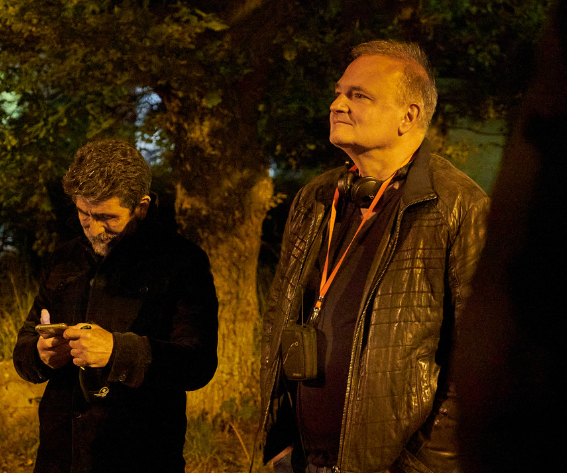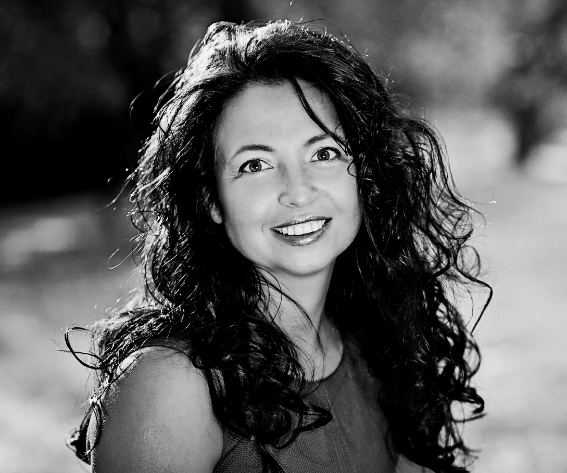Today we are chatting with our October 2021 Film of the Month winner, Pierre J. Secondi, whose film ‘The Warziniek’s File‘ managed to win three other awards, including Director of the Month, Screenwriter of the Month, and Actor of the Month. The filmmaker is no stranger to TMFF, as he had participated in the festival before with two outstanding works which won awards.
DD: Pierre, congratulations on the impressive achievements! ‘The Warziniek’s File is definitely a film worthy of the praise and recognition it gets. How satisfied are you with the way the film was received by the audience and critics?
PJS: It’s incredible! The film has just started its festival life, and I didn’t expect it to be so well received by audiences and critics. I get a lot of messages from people who saw the film and loved it, and I am very touched by that. The film has already won 13 awards, and it is extremely rewarding. It’s a job where you constantly question yourself and oscillate between periods of extreme excitement and darker moments. Receiving this kind of recognition allows you to move forward and say “ok, maybe I chose the right path”.
DD: David Lynch says that ideas are like fish, and if you want to catch the big fish, you’ve got to go deeper. How did you catch the idea for this film?
PJS: The idea was born in 2013: one day, I was at a doctors appointment, and when he scanned my Social Security card, he told me that it was not working anymore. So I got in touch with the adminstrative service, and there I was told that I did not appear anywhere in their database: I did not exist. After several absurd conversations, I finally got my new Social Security card. I told my friend and co-writer, Maxime J. Richard about this story, and we started to push the cursor to create an even more absurd situation. That is how “The Warziniek’s File” was born.
DD: The film has a remarkably genuine take on dystopian concepts both in the framework of visual grammar and the depiction of themes. Considering the turbulent times we live in today, do you believe that this genre is more relatable and attractive than before?
PJS: Yes, absolutely. I believe this is simply because a lot of dystopian concepts ended up as realities of the present world, and therefore there is a stronger identification from the viewer. At the very beginning of the writing process, the world in which Paul was evolving was not at all as seen in the film: there were not all the interfaces; we were in a world where paper and hardware were ubiquitous. But over time, we wanted to tackle subjects like dematerialization, and therefore we had the idea of integrating these personal interfaces that govern the lives of the citizens in this world.
DD: The Warziniek’s File offers a complete experience in every aspect of filmmaking, from picture to sound and postproduction. What were the biggest challenges that you faced in the making of the film, from initial idea to final product?
PJS: I think the first big challenge of this film was to find the right location for the government building, which is the antagonist in this story. I wanted it to represent a welcoming place at first glance but to become more and more ominous and oppressive like a trap closing in on Paul Warziniek. It had to become a real labyrinth as Paul advanced through his journey. During preparations, I worked a lot on the colors and therefore, when I found this location – which is a building of the University of Jussieu in Paris – with all these colors, I said to myself that I had found my government building. The second big challenge was the interfaces to integrate into the film. We had to think about them, shape them out, think about the best way to proceed on set to give the actors freedom. It was a lot of work, but I am very happy with the end result.
DD: Julien Pestel won our Actor of the Month award for his excellent portrayal of Paul Warziniek! He is a versatile actor with immense skills and talent that you successfully exploited as a director here. Did you write the protagonist’s role with him in mind? How was working with Julien Pestel?
PJS: Yes absolutely, I wrote the film with Julien Pestel in mind. He is an excellent actor and above all a very close, long-time friend. It was great to work with Julien, he’s a very involved actor, he was constantly thinking about his character. He was always suggesting things to build up the character of Paul. We’ve made a lot of short films together, very often comedies, but this time around, I wanted something different. While there is humor in this movie, there is something darker in the character of Paul, and Julien captured it perfectly in his performance.
DD: Among the abundance of awards is Screenwriter of the Month. This valuable recognition tells about the film’s qualities but also speaks about your dedication as a screenwriter. Tell us more about your creative process and habits. How many revisions The Warziniek’s File went through before you felt that it’s ready?
PJS: Yes it’s really rewarding to win this type of prize because the script is really the most important element of a film. In my opinion, if we don’t have a good story to tell, the film should not exist. With Maxime J. Richard, we wrote several short films together, and it’s a real pleasure every time! Maxime had insane ideas for this film; he is really good at storytelling. We worked on this script for a long time; I believe the first version dates back to 2014. We then worked with different production companies, so the script evolved a lot, but we could not find an agreement with the producers, especially about the ending. We had a very clear and precise idea of the ending, but not everyone liked it. Until Julien Vicaire, the film’s producer, read the script and really liked it as it was. He was also the one who pushed us to integrate futuristic elements like interfaces. On the first day of filming – in February 2020 – the script was at version 18, and it evolved further during filming and obviously during editing.
DD: Is there something new that you learned as a filmmaker with this film that you haven’t with your previous projects?
PJS: When I first started making movies, I was really focused on telling stories in a fluid way, not particularly caring about what the camera was saying. Over time, I learned to place my camera, to choose framing and movements according to the feelings of my characters and the story I wanted to tell. With “The Warziniek’s File” I really went all the way in this direction, and I am very happy with the result because I think that each shot, each choice of staging, tells something about the characters and especially about Paul. I also worked a lot on the colors and their meaning. The colors of the costumes, sets and interfaces are precisely chosen to characterize the characters and their different personalities. It is a job that I did with Barbara Abecassis who took care of the Artistic Direction with me, but also with Delphie Lecquoy who took care of the Production Design. All these colors have been sublimed by the work of the Director of Photography, Romain Fisson-Edeline and the Colorist, Arnaud Laurent.
DD: While preparing for this interview, I read that you were born in Clermont Ferrand, the city that hosts the most prestigious festival for short films. The lines to enter the cinema venues are endless, and during the event, it’s fantastic to see the crowds of young people interested in shorts. Was this something that contributed to your decision to pursue a career in filmmaking?
PJS: Yes, I was indeed born in Clermont-Ferrand, but I moved when I was only two years old. I have never had the opportunity to go to the Clermont-Ferrand short film festival, but I hope to go one day! I have always loved cinema. When I was a child, I used to shoot mockumentaries and short skits with my sisters and my father’s camera. Growing up, I worked on developing my knowledge of movies. I remember at middle school, every Wednesday after class, I went straight to the videoclub to rent a movie. I loved it, but I didn’t realize I could make it my job. It was when I was 16 and saw David Fincher’s “Fight Club” for the first time that I thought “okay I want to do that for a living”!
DD: The Warziniek’s File is a delightful addition to your otherwise rich portfolio. What’s next for you as a director and screenwriter? Is it, perhaps, time for a feature?
PJS: Of course, it’s every director’s dream to make a feature film! I have ideas for short films that I really want to do first! Making a feature film is a very long journey that I haven’t started yet but maybe someday!
DD: Thanks a lot for chatting with us, Pierre! It was an absolute pleasure to spend time with your work, and we look forward to your next project!
PJS: Thank you and to everyone in the festival’s team! It was an honor to receive these awards and to be able to discuss the film!









Leave a reply